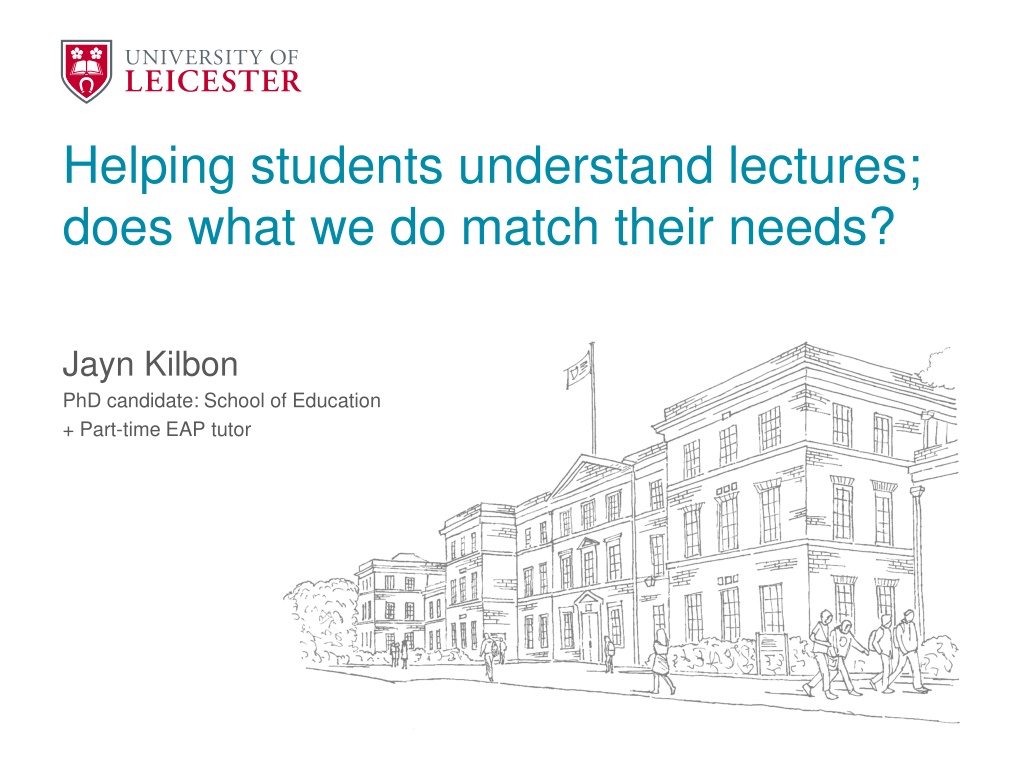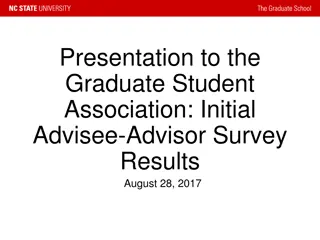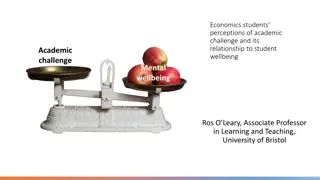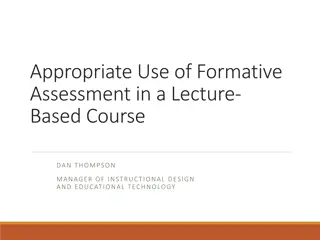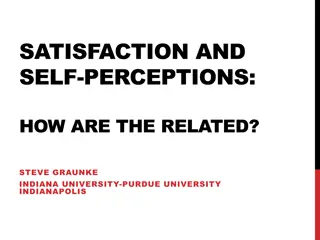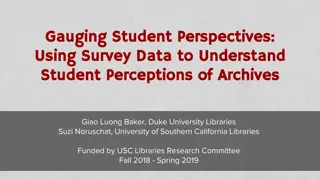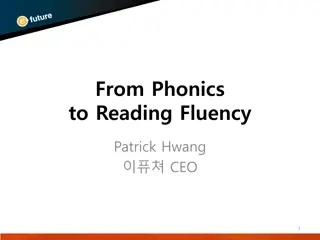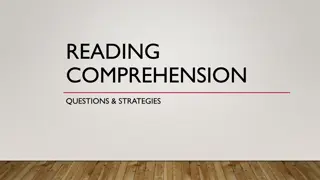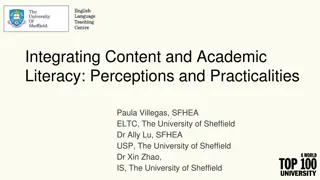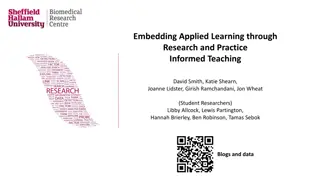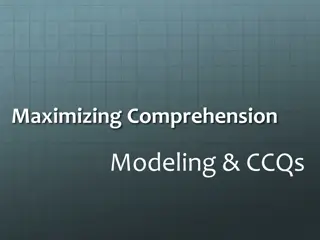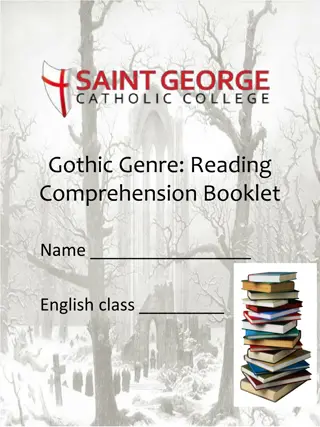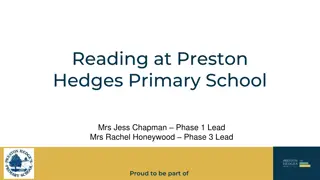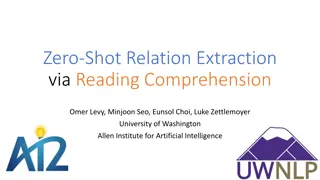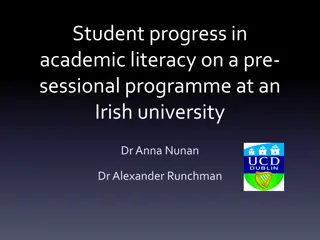Understanding L2 Lecture Comprehension: Student Perceptions and Research Insights
Exploring factors influencing L2 student comprehension of academic lectures, a PhD candidate delves into student perceptions compared with tutors and lecturer views. Through a longitudinal case study at a British university, data collection involves interviews and lecture observations to uncover key challenges such as terminology, subject knowledge, speed, accent, and note-taking. The study aims to enhance support for post-graduate L2 students in lecture comprehension.
Download Presentation

Please find below an Image/Link to download the presentation.
The content on the website is provided AS IS for your information and personal use only. It may not be sold, licensed, or shared on other websites without obtaining consent from the author. Download presentation by click this link. If you encounter any issues during the download, it is possible that the publisher has removed the file from their server.
E N D
Presentation Transcript
Helping students understand lectures; does what we do match their needs? Jayn Kilbon PhD candidate: School of Education + Part-time EAP tutor
L2 Lecture Comprehension Research The discourse of academic lectures and the effects different discourse features have on L2 comprehension (e.g. Crawford Camiciottoli 2004, Jung 2003, Littlemore 2001) The cognitive processes used by L2 listeners to process academic texts (e.g. Field 2009, Rost 1994). L2 students perceptions of the problems they have with lecture comprehension (e.g. Flowerdew and Miller 1992, Lynch 2015, Mulligan and Kirkpatrick 2000).
PhD research into L2 students comprehension of academic lectures Broad aims; To identify the factors which L2 students think affect their understand of academic lectures. To compare student perceptions with EAP tutor and academic lecturer perceptions. To identify whether the student perceptions change between entering the university as a pre-sessional student (IELTS 5.5) and the end of their taught post-graduate input.
Data Collection Focus on PGT students at a British university Longitudinal case study (July 2015 to April 2016) Semi-structured interviews + 8 lecture observations 7 x post-graduate L2 students (interviewed 6 times) 9 x EAP tutors teaching on a summer pre-sessional 1 x EAP Course Director 5 x academic lecturers
Pre-sessional listening materials 10 week course (entry point IELTS 5.5) 28 x 90 minute lessons with listening aims Typical listening aims Listen for main points / detail (15 aims) Note-taking skills: structuring notes / styles of notes / practice note-taking (8 aims) Identify sign-posting language (2 aims) Identify features of connected speech (1 aim) Identify emphasis (1 aim) Identify the difference between evidence and conclusions (1 aim)
Student perceptions: Interview 2 What is the main problem that you think you will have understanding lectures? Terminology / vocabulary: 6 students Lack of subject knowledge: 3 students Speed: 2 students Accent: 1 student Note-taking: 1 student
Complexity / dynamic systems theory Traditional research focuses on cause and effect relationships whilst complex / dynamic systems research analyses how a number of variables within a system interact (D rnyei 2011) Second language classrooms should be researched as complex systems because in teaching and learning simple, linear cause and effect relationships are unlikely to exist (Burns and Knox 2011)
Complexity Adaptive Systems Systems are open with difficult to define borders Contain a large number of elements / variables which have dynamic interactions Elements within the system influence or are influenced by several other elements Interactions between the elements are non-linear Positive or negative feedback loops can occur within the interactions (Cilliers 2002)
Student Perceptions Connected speech Includes pictures / examples Subject knowledge Decoding Recognising words Lecturer L1 Vocabulary Length of lecture Pre- lecture Speed of input Interesting Listening Linked to assessment distractions Time Motivation Lecture Difficulty comprehension L1 Vocabulary support Staying focused Pre-lecture support Lecturer reading from ppt Recording lectures Note-taking PPT Listening and reading Transcription or encoding Need to understand input PPT helps identify main points Amount of text Listening and writing L1
Skills / language covered by the pre-sessional course Connected speech Decoding Vocabulary Signposting language Listening Lecture comprehension Note-taking Transcription Need to understand input Listening and writing
Student Perceptions: interview 6 How could the pre-sessional course be improved? [pre-sessional] course [ ] do not have many information [ ] they have lots of information in this [academic] module maybe let us attend more lecture to experience it [ ] I think if I adapt with environment it will help me more we have to read a lot of um reference for nowadays lecture so if [the pre- sessional] can recommend a reference like what we read right now and do a lecture, like what we study right now, and that will help us to more familiar with the structure or the style or the stress. [Pre-sessional] style is very [ ] easy and not stressful as right now. maybe it should be more specific for example management students to talk about management topic and uh the other students about their own fields
What should pre-sessional courses do? Some ideas! Develop automaticity (bottom-up processing) Develop pre-lecture preparation skills Develop skills to deal with simultaneous aural and written visual input Focus note-taking on encoding not transcription Incorporate skills for using lecture capture to improve comprehension Include subject specific knowledge (in-class?, on own? in conjunction with departments?)
How can we evaluate the effectiveness of EAP? Longitudinal research In depth qualitative research Focus on students real academic experiences Investigate variables and complex interactions instead of cause and effect relationships
References Burns, A. and Knox, J. (2011) Classrooms as Complex Adaptive Systems: A Relational Model. TESL-EJ,15(1), pp. 1-25. Cilliers, P. (2002) Complexity and Postmodernism : Understanding Complex Systems (1), London, US:Routledge. Crawford Camiciottoli, B. (2004) Interactive discourse structuring in L2 guest lectures: some insights from a comparative corpus-based study. Journal of English for Academic Purposes,3(1), pp. 39-54. D rnyei, Z. (2011) Researching complex dynamic systems: Retrodictive qualitative modelling in the language classroom. Language Teaching,47(1), pp. 80-91. Field, J. (2009) The cognitive validity of the lecture-based question in the IELTS listening paper. in P. Thompson (Ed.), (ed.) IELTS Research Reports,London: British Council. pp. 17-66. Flowerdew, J. and Miller, L. (1992) Student perceptions, problems and strategies in second language lecture comprehension. Regional English Language Centre Journal,23(2), pp. 60-80. Jung, E. H. (2003) The Role of Discourse Signaling Cues in Second Language Listening Comprehension. The Modern Language Journal,87(4), pp. 562-577. Larsen-Freeman, D. (2016) Classroom-oriented research from a complex systems perspective. Studies in Second Language Learning and Teaching, 6(3), pp. 377-393. Larsen-Freeman, D. and Cameron, L. (2008) Complex Systems and Applied Linguistics, Oxford:Oxford University Press. Littlemore, J. (2001) The Use of Metaphor in University Lectures and the Problems that it Causes for Overseas Students. Teaching in Higher Education,6(3), pp. 333-349. Lynch, T. (2015) International students perceptions of university lectures in English. International Student Experience Journal, 3(1). MacIntyre, P. D., D rnyei, Z. and Henry, A. (2014) Conclusion: Hot Enough to be Cool: The Promise of Dynamic Systems Research. in D rnyei, Z., Henry, A. and MacIntyre, P. D., (eds.) Motivational Dynamics in Language Learning,Bristol: Multilingual Matters. pp. 419-429. Mulligan, D. and Kirkpatrick, A. (2000) How Much Do They Understand? Lectures, students and comprehension. Higher Education Research & Development,19(3), pp. 311-335. Rost, M. (1994) On-line summaries as representations of lecture understanding. in Flowerdew, J., (ed.) Academic Listening: Research Perspectives,Cambridge: Cambridge University Press. pp. 93-127.
